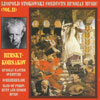Stokowski conducts Russian Music
View record and artist detailsRecord and Artist Details
Composer or Director: Nikolay Rimsky-Korsakov
Genre:
Orchestral
Label: Biddulph
Magazine Review Date: 3/1994
Media Format: CD or Download
Media Runtime: 68
Mastering:
Mono
ADD
Catalogue Number: WHL010

Tracks:
| Composition | Artist Credit |
|---|---|
| Russian Easter Festival Overture |
Nikolay Rimsky-Korsakov, Composer
Leopold Stokowski, Conductor Nikolay Rimsky-Korsakov, Composer Philadelphia Orchestra |
| (The) Maid of Pskov (Ivan the Terrible), Movement: Hunt and Storm music |
Nikolay Rimsky-Korsakov, Composer
Leopold Stokowski, Conductor Nikolay Rimsky-Korsakov, Composer Philadelphia Orchestra |
| Scheherazade |
Nikolay Rimsky-Korsakov, Composer
Leopold Stokowski, Conductor Nikolay Rimsky-Korsakov, Composer Philadelphia Orchestra |
Author:
We take orchestral virtuosity for granted now, but in the late 1920s it was pretty uncommon, and Stokowski's recordings with the Philadelphia Orchestra made an enormous impact on music-lovers of the day. It wasn't just the case of a great conductor in charge of an ensemble which he had moulded towards perfection of execution: it was the weight and quality of sound he was able to get out of early electric recording, which somehow made itself felt even on inferior gramophones of the day.
That pre-war Philadelphia sound is still impressive. Depth of tone and luminosity are of course enhanced by modern reproduction. The uniquely warm, flexible string tone is still highly seductive, and there is a satisfyingly firm bass line. Some of the performances are controversial, but Russian romantic repertoire always brought out the best in Stokowski.
The Russian Festival Overture receives a thrilling account. An abundance of fire, atmosphere and colour are present, and I could well play this item to any uninitiated listener as a perfect example of Stokowski's art. The Maid of Pskov excerpt makes little effect out of its operatic context, but the performance of Scheherazade is quite magical. Those sensitive to surface noise should note that the first and third movements are a little noisy, but throughout the work (and indeed throughout the disc) Ward Marston gets very good sound from his source material.
Biddulph have interestingly provided an unpublished alternative version of Scheherazade's first movement, recorded on three sides in May 1927, five months before the two-sided account which was published. It would seem that Stokowski was obliged to get the movement on to two sides in order to prevent the set from spilling over on to a sixth record. A reduction of 50 seconds in a movement lasting less than ten minutes makes a big difference, and I much prefer the extra spaciousness and elegance of the earlier version. The performance in general is passionate, richly evocative, and tremendously exciting in the last movement.'
That pre-war Philadelphia sound is still impressive. Depth of tone and luminosity are of course enhanced by modern reproduction. The uniquely warm, flexible string tone is still highly seductive, and there is a satisfyingly firm bass line. Some of the performances are controversial, but Russian romantic repertoire always brought out the best in Stokowski.
The Russian Festival Overture receives a thrilling account. An abundance of fire, atmosphere and colour are present, and I could well play this item to any uninitiated listener as a perfect example of Stokowski's art. The Maid of Pskov excerpt makes little effect out of its operatic context, but the performance of Scheherazade is quite magical. Those sensitive to surface noise should note that the first and third movements are a little noisy, but throughout the work (and indeed throughout the disc) Ward Marston gets very good sound from his source material.
Biddulph have interestingly provided an unpublished alternative version of Scheherazade's first movement, recorded on three sides in May 1927, five months before the two-sided account which was published. It would seem that Stokowski was obliged to get the movement on to two sides in order to prevent the set from spilling over on to a sixth record. A reduction of 50 seconds in a movement lasting less than ten minutes makes a big difference, and I much prefer the extra spaciousness and elegance of the earlier version. The performance in general is passionate, richly evocative, and tremendously exciting in the last movement.'
Discover the world's largest classical music catalogue with Presto Music.

Gramophone Digital Club
- Digital Edition
- Digital Archive
- Reviews Database
- Full website access
From £8.75 / month
Subscribe
Gramophone Full Club
- Print Edition
- Digital Edition
- Digital Archive
- Reviews Database
- Full website access
From £11.00 / month
Subscribe
If you are a library, university or other organisation that would be interested in an institutional subscription to Gramophone please click here for further information.




